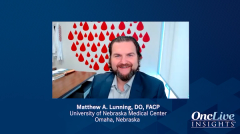
Follicular Lymphoma: Patient Monitoring and Maintenance Therapy
Before closing out their discussion on first-line management of follicular lymphoma, experts consider the importance of patient monitoring and discuss the diminished role of maintenance therapy.
Episodes in this series

Transcript:
Sameh R. Gaballa, MD: This is an area where there’s a lot of heterogeneity in terms of practice. What do you do after you’re done with induction? You get an end-of-treatment PET and the patient is in CR [complete response]. How do you monitor these patients? How often do you get imaging? I agree with you, in the real world, there is a lot of heterogeneity. I’ve seen referrals come in with patients who’ve had scans every 3 months for several years. But for me personally, I agree that less imaging would be my approach. Because this is not a disease where if you catch it early, it’s going to necessarily change your treatment algorithm if the patient is asymptomatic. So what I’ve done is at least maybe every 6 months, maybe for a year or 2, and then afterwards, it’s either maybe an annual scan or just scan on an as-needed basis. A lot of this is driven by a discussion with the patient because different patients will have different attitudes about monitoring. Again, we explain to them that even if there’s…[a] relapse, we would not jump to treatments right away. But some patients want to feel more in control. For those, if they’ve been in remission for a year or 2, typically, I would say, Well, we could get imaging maybe not more than annual, and others [are] OK with doing an as-needed scan. So this is an area where there are, again, a lot of different approaches in the real world, and [it] also depends on how the patients take it. In terms of maintenance therapy, there have been randomized studies—maintenance treatment does have better PFS [progression-free survival] and a longer time to next treatment. But again, the survival is the same. In the era when we had COVID-19, I basically stopped all maintenance therapies. Previously I used to discuss the risks and benefits, and I’ve certainly seen risks from maintenance therapies including increased infection risks, and some of these infections can sometimes be serious. So at this time, I do not recommend maintenance therapies again because of COVID-19 and increased infectious complications. But we used to do it more often prior to COVID-19.
Matthew A. Lunning, DO, FACP: Yes, I agree with you. I pulled almost all of my patients off maintenance rituximab in follicular lymphoma. I think the 1 scenario, outside follicular lymphoma, where I still have the conversation is in mantle cell lymphoma, especially after an auto transplant, but different disease, different beast in some situations in regard to non-Hodgkin lymphoma and its occult management. I agree with you, though, about scans. Scan anxiety lives on the spectrum. You have patients who fear that they aren’t watching it and want to scan, and you have people who just walk into the room or the building that they’re going to have a scan and are [vomiting] and need their Zofran because they’re so concerned. But if you don’t do a scan, they’re fine. So this is where the relationship in these follicular lymphomas—which, yes, it’s a lifelong condition, and you can remember the patients who surpass with follicular lymphoma because your goal, as their oncologist, is to have them live with their follicular lymphoma and only treat it when it’s impacting their quality of life. If it transforms, then that’s one of those prognosis-changing events, but that’s where our job is following their follicular lymphoma to look for what triggers that biopsy that shows transformation. That’s just a whole different beast in itself and where our therapies evolve in this situation. So it’s one of those things like, Why do you have to see me? And it’s like, I have to see you because I need to make sure that you’re not—I’m always walking in the room going, Is this patient transforming? And do they need a scan? And that’s why we see [patients with] follicular lymphoma even when they’re years out from their initial therapy.
Sameh R. Gaballa, MD: Exactly.
Transcript edited for clarity.









































